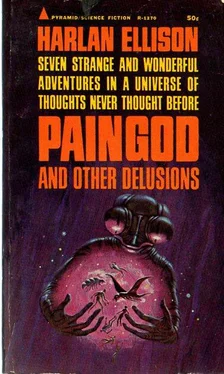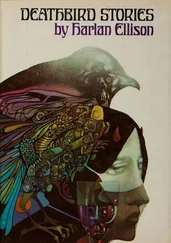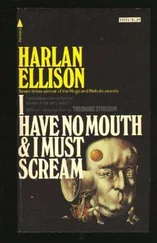Are you aware of how much pain there is in the world?
Yeah, I’m aware. Now. Because I’ve been writing for eighteen years and I keep getting these letters, and I keep listening to people, and at times it’s too much to handle. If you don’t know what I’m talking about, go read Nathanael West’s MISS LONELYHEARTS.
And so I write these introductions, what my friend and the brilliant writer Avram Davidson calls “going naked in the world.” Avram wrote me recently and, in the course of taking me to task for something he believed I had done wrong, he more-than-mildly castigated me for dumping it all on paper. Well, he’s not the first, and from time to time I’ve considered never writing another of these self-examinations. But Irwin Shaw said, “A man does not write one novel at a time or one play at a time or even one quatrain at a time. He is engaged in the long process of putting his whole life on paper. He is on a journey and he is reporting in: ‘This is where I think I am and this is what this place looks like today.’ ”
This report, then, is about pain. The subject is very much with me. My mother had another heart attack, and the general topic of mortality obsesses me these days. We will all die, no reprieve. A beautiful young lady of my acquaintance, who happens to be an accomplished astrologer, told me (though she knows I don’t believe in astrology) that my chart says I’m going to die by being beheaded. Terrific remark. She told it to me one night when we were out on a date, and she was surprised that I turned out to be no goddam good in bed that night.
Well, she needn’t have been so surprised; I know I’m going to buy the farm one day, sooner or later depending on how much I run my mouth in dangerous situations. But it isn’t death that bothers me, it’s dying alone.
So I think about pain, and I present you with this group of stories that say a little something about what I’ve learned on the subject. They may not be terribly deep or illuminating, just some random thoughts I’ve had through the years. A few of them seem funny, and they were intended so because I think the only things that get us through the pain are laughter and the promise of love to come. At least the possibility of it. But each one of them has some special pain in it, and I urge you to seek it out, through the chuckles and the bug-eyed aliens and the what-if furniture that makes these stories and not sermons.
Because there’s only one thing that links us as human beings: the universality of our pain and the commonality of our need to go out bravely.
Harlan Ellison
9 November ’74
Introduction to First Edition
Spero Meliora: From the Vicinity of Alienation
THIS IS MY ELEVENTH BOOK. (It should have been thirteen, counting the one I did under a pseudonym for a schlock publisher because I needed the money some years ago, but number twelve was a false start Avram Davidson and myself wish had never happened and fortunately never got into print, and thirteen is a book of short stories no one seems constitutionally capable of publishing, and which seems well on its way to becoming an “underground classic” for those who have read it in manuscript form.) That doesn’t seem too bad, for thirty years; twenty of which were spent in learning on which end of this particular body the head was attached.
Very nearly all of the past ten books have had some sort of introduction or prologue by myself. I have the feeling it is necessary to know what a writer stands for, in what he believes, what it takes to make him bleed, before a reader should be asked to care about what the writer has written. This is patently foolish. B. Traven writes eloquently, feelingly, brilliantly, yet he is an unknown quantity. Wilde’s life contradicts most of what he wrote. Shaw and Dickens and Stendhal were virtually anonymous in their seminal, important years, yet what they wrote remains keen and true and valid. Granted, the philosophy of “love me, love my writing” is my problem. Still, it is the one to which I pander, and so each of my books has had some viscera-revealing treatise at the opening, from which the usual reader reaction has been total revulsion and a mind-boggling reeling-back in disbelief. I have the unseemly habit of going naked into the world. It comes from a seamy desire on my part not only to be a Great Writer, but to Be Adored as well.
There is no introduction this time.
I’m tired.
This is my first book in over two years. (In early 1962 I came out to Hollywood, as part of a package deal that involved dismembering a marriage and fracturing a small but intense group of lives. I’ve been here over three years, as this is written, and I’ve been busy making a decent living in television and feature films to do much book work. And I cry a lot.)
I hit thirty-one last May; I turned around, and I’d grown up. I knew Santa Claus was a winehead who spent the other eleven months sopping up watery chicken soup with brown bread in a Salvation Army kitchen; the Easter Bunny was only Welsh Rarebit mispronounced; “good women” exist in their idyllic state mostly in weak novels by Irving Wallace, John O’Hara, Fannie Hurst, and Leon Urine (my misspell, not the typesetter’s); Marilyn Monroe, Camus, and JFK got cut off in their prime, and the eggsucking monsters who buried those three Civil Rights workers twenty-one feet down are running loose; and the sense of wonder has been relegated to buying old comic books and catching The Shadow on Sunday radio, trying to find out where that innocence of childhood or nature went.
So there is no introduction. It has made this book incredibly belated in appearing already. Seven times I tried to start an introduction to it, while Don Bensen (an incredibly patient, longsuffering, extremely fine editor) was stunned by the hammers of deadlines, publishers, schedules, and irresponsible authors. And seven times I came to ass-grinding halts.
The first few times it was a compendium of bitter, cynical comment on writing for the science fiction field. Then there was a lighthearted rollicking essay on Life in Our Times, but by the time I had hit the thirty-six ball-less wonders who watched Catherine Genovese get knifed to death in New York, my rollick was a bit strained. So I attempted a more serious assaying of the contemporary scene. It touched on such matters as the afternoon I was called a Communist by the bag-boy in the Thriftimart because I objected to the Goldwater pamphlets at point-of-sale; the impertinence and nosiness of credit checks for job applications or credit cards; the shocking bastardization of news media and lack of responsibility thereof; the fetish for style and luxury, not safety, in new cars.…
Oh, I went the route.
And when I was done, it took three close friends to keep me from dashing into the bathroom and opening an important vein with the new beep-beep Krona edge.
So I tried a sixth attempt. A personal statement about how crummy it was writing for television, and seeing your best work masticated and grab-assed and garbaged-out by no-talents afraid of their shadows. But that was only a repeat of a speech I made at the World SF Convention last Labor Day, and my attorney warned me if I put it into print (instead of playing it via tape at parties), I’d be sued for roughly eleven million beans. So there was a seventh attempt, in which I commented sagely on the stories in this book.
But let’s face it, friends, this book simply ain’t gonna change the course of Western Civilization, and Orville Prescott is too busy simpering over Updike to find time for a paperback novelist, so what the hell.
So there is no introduction to this book.
There are some pretty fair science fiction and fantasy stories here, and one or two I particularly like because they say something more than The Mutants Is Coming; if Bensen can wangle the space away from Pyramid’s advertising department to cut the latest notification of a Taylor Caldwell or Louis Nizer offering, there may or may not be a photo of me on the back of the book (should you happen to be the sort of good-looking broad who digs writing to weary authors, but need to know they aren’t hunchbacked lepers before committing yourself); there is a nice cover; and a fair-traded price.
Читать дальше












